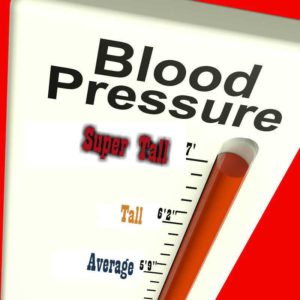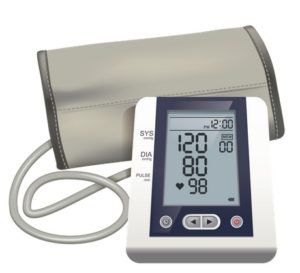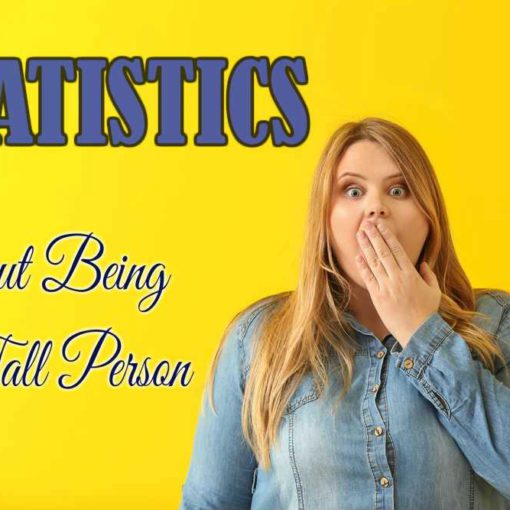I hope you love the products I've recommended below, just a heads up that as an Amazon Associate, I earn from qualifying purchases. This means I may earn commissions on products bought via links on this page.

The average American is 5 feet, 9 inches – as a result, anything larger than this is considered “tall” in America. Being tall comes with many advantages: You may be more athletic, able to reach things easier and viewed as more attractive by many in society. But, it also comes with its health problems, including an increased rate of cancer, heart disease and likelihood of getting blood clots.
How Blood Pressure Is Measured
Blood pressure is essentially a number that represents the amount of pressure which your blood exerts against the walls of your artery. When you get your blood pressure measured, you get two numbers, which are millimeters of mercury.
- Systolic blood pressure (the number you get first). What this number represents is how much pressure is applied to your artery walls at the same time of which your hear beats.
- Diastolic blood pressure (the other number you will receive). This is a measurement of between the heart beats this time, both of which are measured when your heart is at rest.
Longer Arteries = Higher Blood Pressure?
For the purposes of answering the question of “do tall people have higher blood pressure,” it’s important to understand how blood pressure works. Taller people obviously have a longer total amount arteries and veins due to their longer torsos.
This means blood flow has to travel a longer distance in order to get around the lengthened body. For example, when you compare someone that is 5 foot versus 6 foot, the blood has to circulate an extra foots worth of distance for the taller person.
Because of this, it makes sense to think that a higher blood pressure is necessary. This is because the heart would, in theory, have to work harder to get the blood pumping everywhere it needs to go, thus requiring more force – and thus leading to a higher blood pressure.
Are Tall Children At Risk Of Higher Blood Pressure
There are studies which show that taller children do have higher blood pressure than shorter ones, although the correlation is a relatively weak one. This finding has been backed up in children in western countries and in Japan.
Based on these studies, you would think that, when it comes to adults, blood pressure should increase with height. However, as noted in this Scientific American article, the change is relatively small, and that’s why the “ideal” blood pressure of 120/80 does not change regardless of how tall a person is.
The article goes on to note that, while blood pressure does and should change with height, other factors (such as weight, smoking and race) have a much greater impact on blood pressure.
Indeed, generally speaking, children and teenagers are more likely to have their blood pressure increase with height, but that effect seems to be smoothed over by the time those children reach adulthood.
Sleeping Can Help Reduce Blood Pressure
The body has natural stress hormones, which is unavoidable. But did you know that when you sleep your body processes these hormones. This is important because stress hormones are known to raise your blood pressure by narrowing your blood vessels.
What does this have to do with being tall you ask. Well tall people are often deprived of suitable sleeping arrangements due to their longer bodies. So getting a good nights sleep is often a mission.
Body pillows can also affect the quality of sleep, in a good way, yet many are too short for tall people. Fortunately some body pillows are up to 100 inches long, so the tall person can fully immerse themselves in comfort and relaxation. All whilst eliminating stress hormones which can cause higher blood pressure.
Does Blood Pressure Depend On Weight?
This leads to a second and equally important question: Does blood pressure depend on weight? The short answer to this is absolutely yes.
Heavier weight means higher blood pressure for the same reason that height can have an impact. However, these effects are even stronger in people who are obese.
As you gain weight, you add blood vessels to provide blood and other nutrients to the added fat tissue. Your blood needs to get more places, requiring that your heart works harder to get blood everywhere it needs to go. All of this extra weight not only increases your blood pressure, but it forces your heart rate to increase.
All of this leads to blood pressure disorders like hypertension, which occurs when your blood pressure is greater than 130/80. Unfortunately, there is no doubt: Hypertension is directly related to obesity and being overweight, as has been proven in multiple studies.
High blood pressure can lead to a variety of health problems, including damaged or narrowed arteries, aneurysms, coronary heart disease or heart failures. Overweight individuals are highly susceptible to these disorders.
Furthermore, the danger of high blood pressure is not just limited to heart or circulatory problems. Hypertension is connected to strokes, dementia cognitive impairment, kidney damage, eye problems, sexual dysfunction and more.
How To Reduce Blood Pressure When You’re Tall
As mentioned earlier, a good nights sleep and afternoon naps are known ways to help manage blood pressure. As a tall person, there’s no difference to lowering your blood person compared to someone shorter in terms of remedies.
The same proven remedies exist whether your big and tall or slender and tall. The key takeaway for a tall person is that you will simply need height enabled exercise equipment. Most standard equipment is not suitable for someone over 6 foot. So to get the best out of your exercise, you need to ensure its suitable to your height.
- Regular exercise. As noted by the American Heart Association (AHA), weight loss of as little as five to ten pounds can actually lower your blood pressure. The AHA recommends a minimum of 150 minutes of moderate intensity aerobic activity every week.
- Maintaining a diet that is low in fat and salt. Both fat and salt can increase blood pressure and your risk of hypertension.
- Eating healthier foods and increasing your intake of fruits and vegetables. Some foods are directly tied to lower blood pressure, including leafy greens, berries, red beets, oatmeal, bananas and more.
- Decreasing consumption of alcoholic beverages. As noted by the Mayo Clinic, heavy drinkers who reduced their alcoholic intake to even moderate levels were able to reduce their blood pressure. While specific intake rates vary, it is clear that a reduction in drinking alcoholic beverages can reduce your blood pressure.
Should You Be Concerned If You’re Tall
The overall consensus is that yes, being taller does have a slight affect on your blood pressure. But as it’s a small amount, there’s no ruling to change the 120/80 figure with a persons height.
So should you be concerned?. If you’re concerned in the slightest, its always best to seek medical advice. There are numerous reasons you could be experiencing higher blood pressure than normal and many natural ways to reduce your blood pressure limit at the same time. While it may be concerning, speaking to your Doctor is the safest route you can take whether you’re short or tall.







